GL Enhances MEGACO (H.248) Protocol Emulator for TDM-IP Gateway Simulation
Welcome to another May 2017 issue of GL's Newsletter providing information and insight into our enhanced MEGACO (H.248) Protocol Emulator referred to as MAPS™ MEGACO (H.248) Emulator that simulates Trunking Gateway (TGW) and Residential Gateway (RGW) in hybrid TDM-IP network.
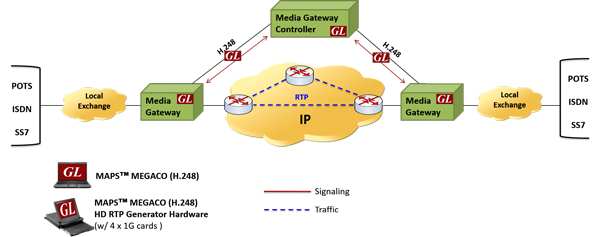
Overview
The MEGACO/H.248 is a signaling and call control protocol used between the Media Gateway Controller (MGC) and Media Gateway (MG). The MGC uses MEGACO/H.248 to instruct MG about the events, media, signals to be played on Terminations, to create a Context, and to audit the status of the Terminations involved in the conversion of media from one type of network, to the media required in other type of the network.
GL’s MAPS™ MEGACO (H.248) Protocol Emulator supports Trunking Gateway and Residential Gateway simulation using binary based H.248 protocol and text based MEGACO protocol in Digital and Analog network respectively. The binary encoding is based on Basic Encoding Rules (BER) description of the protocol and text encoding is based on Augmented Backus-Naur Form (ABNF) description.
MEGACO/H.248 is a signaling and call control protocol used between the MGC and MG for supporting multimedia stream transmission.
Different types of gateways may implement Terminations that have differing characteristics. Variations in Terminations are accommodated in the protocol by allowing Terminations to have optional Properties, Events, Signals and Statistics implemented by MGs.
To achieve MG/MGC interoperability, such options are grouped into Packages, and typically a Termination realizes a set of such Packages.
Supported MEGACO/H.248 Packages are:
- AnalogLine Supervision Package - The package defines events and signals for an Analog line
- RTP Package - This package is used to support packet-based multimedia data transfer by means of the Real-time Transport Protocol (RTP).
- GenericPackage - This package is for commonly encountered error events (Normal Release, Unbelievable Resources, Temporary/Permanent Failures, Inter-working Error).
- DTMF Detection Package - This package defines the basic DTMF tones detection
- Call Progress Generator Package - This package defines the basic call progress tones as signals
- Network Package - This package defines properties of network terminations independent of network type, and other packages
Supported Protocol Standards
| Supported Protocols | Standard / Specification Use |
|---|---|
MEGACO/H.248 |
IETF RFC 3525 / ITU-T Recommendation H.248, ETSI TS 102 374-2 (2004-11) |
Call Simulation
Test Setup for Trunking GateWay (TGW) Simulation
The following image depicts the simulation of Trunking Gateway, which lies between Switched Circuit Network (SCN) and Packet Network that typically terminates numerous digital circuits setup in the lab environment. The test setup also allows generating more than 500 simultaneous calls with multiple T1 E1 cards in the network. Normally, 24 calls on T1 interface and 31 calls on E1 interface can be generated, as per the number of timeslots available on the respective interface.
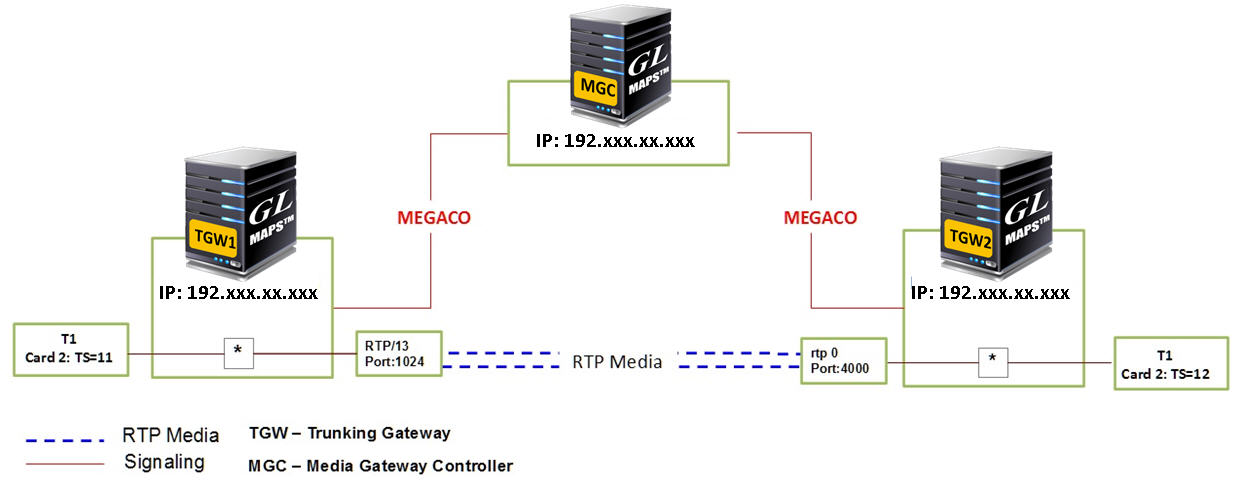
Call between two Trunking GateWays (TGW) in Digital (TDM) Network
The following call flow procedure illustrates call between two trunking gateways connected to the same MGC. In this call scenario MGC generates messages for enabling media flow:
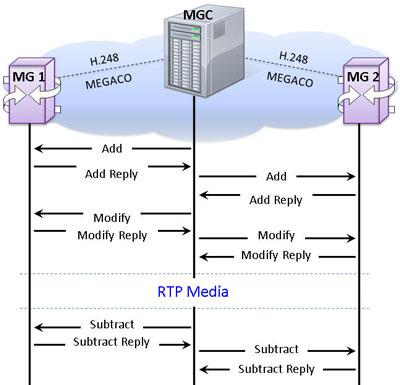
The following MAPS™ Call Generation GUI depicts the typical MEGACO (H.248) call scenario with binary and textual message decodes as shown below:
Test Setup for Residential GateWay (RGW) Simulation
The following image depicts simulation of Residential Gateway (RGW) containing one or two Analogue lines and is located at the customer premises, which interworks an Analog line to a Packet network.
MAPS™ MEGACO/H.248 can simulate User1 calling User 2. RGW simulation includes Analogue events and signals such as Onhook, Offhook, Detect Dialtone, Detect Dial Digits, Digits Generation of Ring and Busy Tone, etc., are required for call simulation.
The test setup also allows generating more than 500 simultaneous calls, configured as per the number of Analog lines in the network.
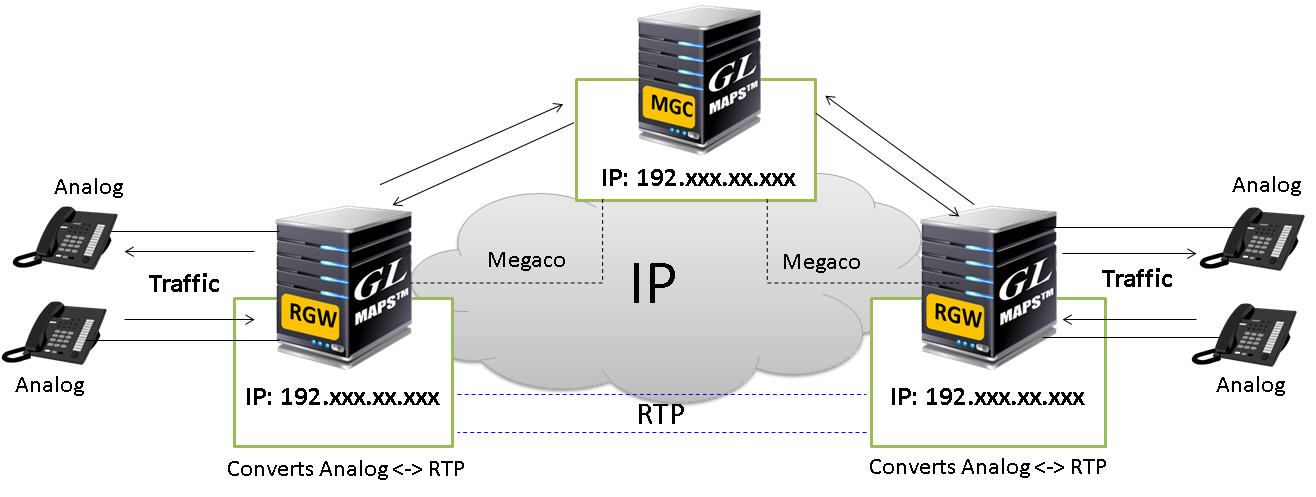
Call between two Residential Gateways (RGW) in Analog Network
The following call flow procedure illustrates call between two Terminations A and B communicating via MGC. In this call scenario, Residential Gateway generates messages for enabling media flow (RTP):
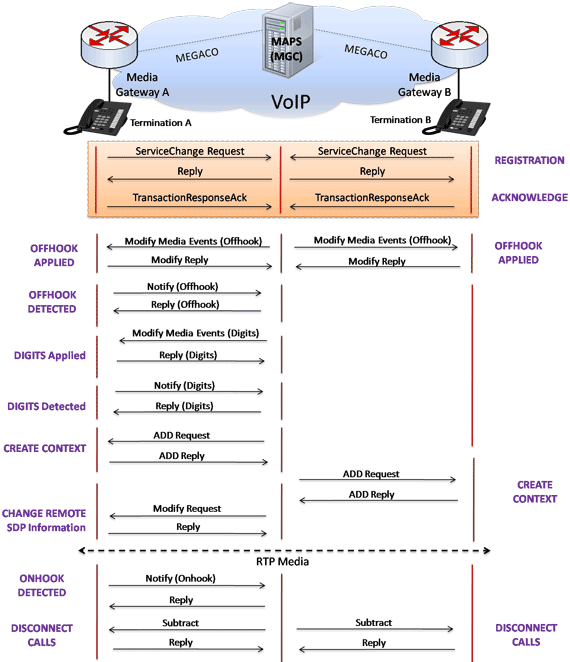
The following MAPS™ Call Generation GUI depicts the typical MEGACO (H.248) call scenario with binary and textual message decodes as shown below:
Important Features of MAPS™ for MEGACO/H.248 Emulator
- Simulates MGC and MG
- Fully integrated, complete test environment for 2G, 3G networks
- Test scenarios to simulate TGW in digital network and RGW in Analog network
- Supports 500+ simultaneous bulk call generation with multiple T1/E1 cards in digital network and can also simulate more than 500+ analog lines in Analog network
- Supports end-to-end gateway testing
- Supported MEGACO/H.248 Packages are:
- Analog Line Supervision Package,
- RTP Package
- Generic Package
- DTMF Detection Package
- Call Progress Generator Package
- Network Package, etc.
- Supports protocol specific messages such as Add, Subtract, Notify, Modify, Move, ServiceChange, AuditValue, and AuditCapabilities
- Supports almost all industry standard codec types - G.711 (mu-Law and A-Law), G.722, G.729, G.726, GSM, AMR, EVRC, SMV, iLBC, SPEEX, and more. *AMR and EVRC variants require additional licenses
- High density call capabilities of up to 20,000 with traffic achievable per appliance (5000 calls per port)
- Supports Client-Server functionality requires additional license; clients supported are Python, Java, TCL and others
- MEGACO protocol test suite supporting conformance testing
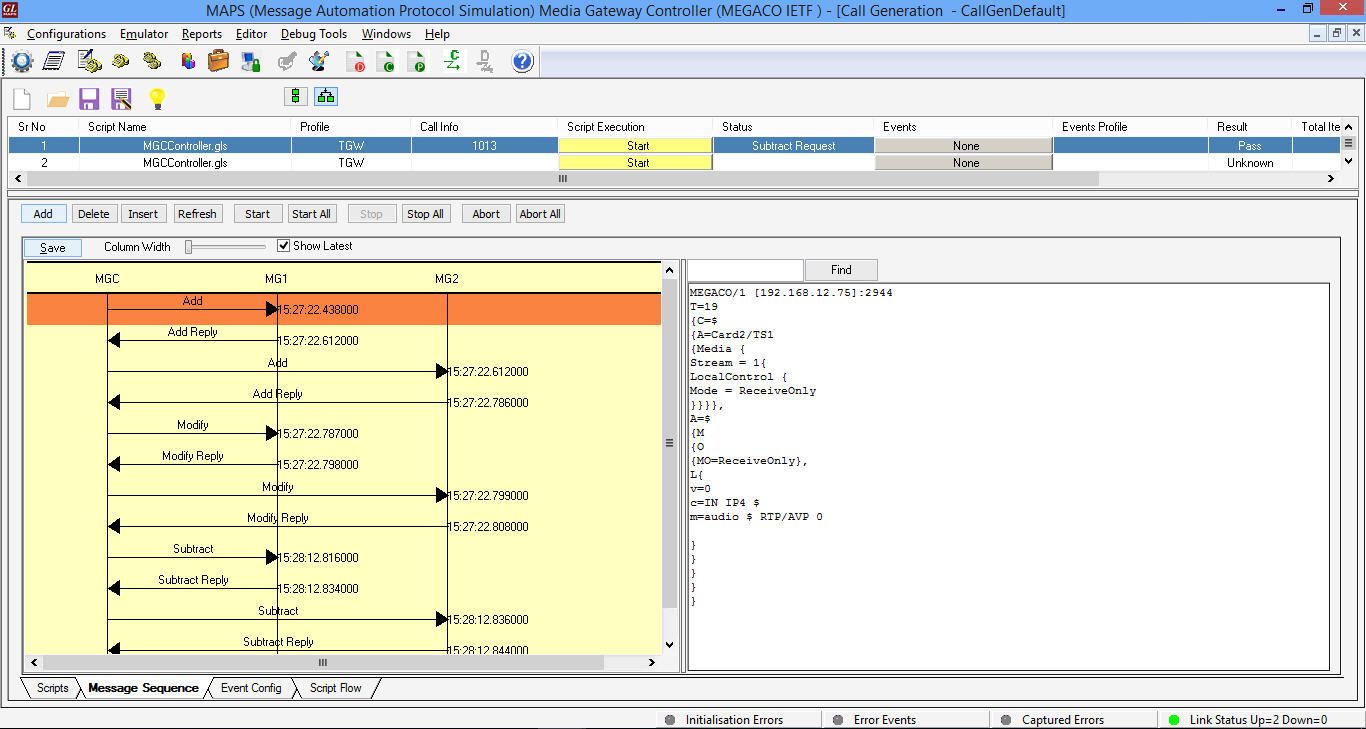
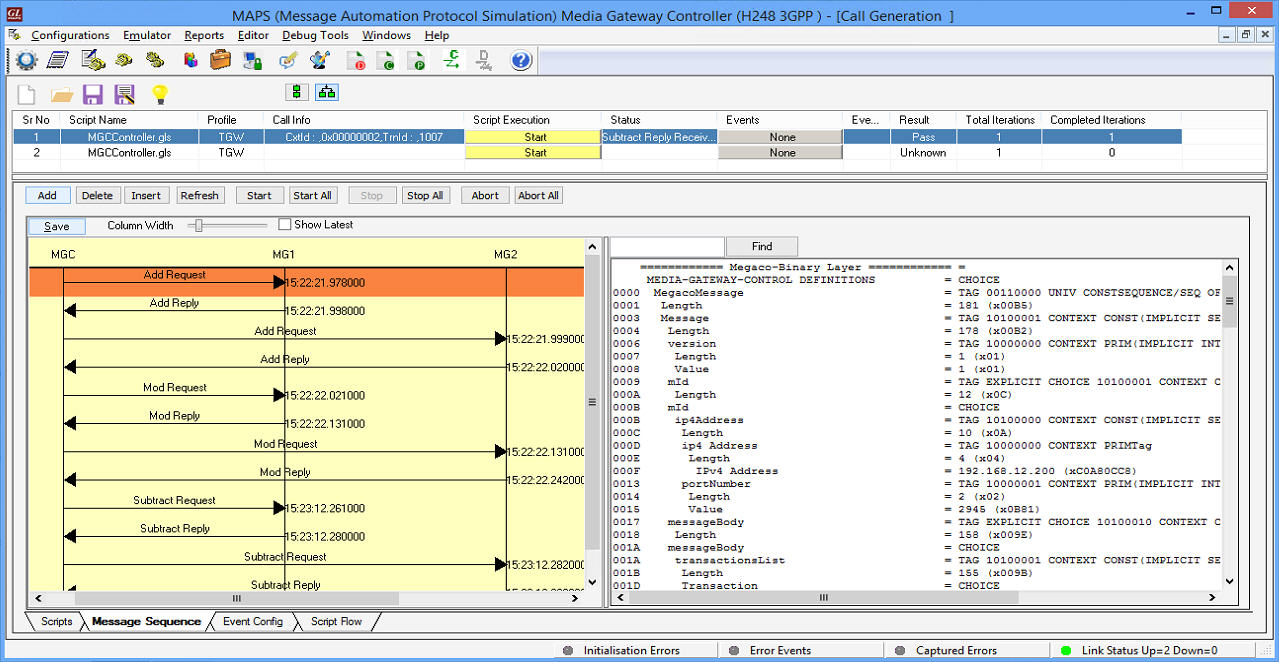
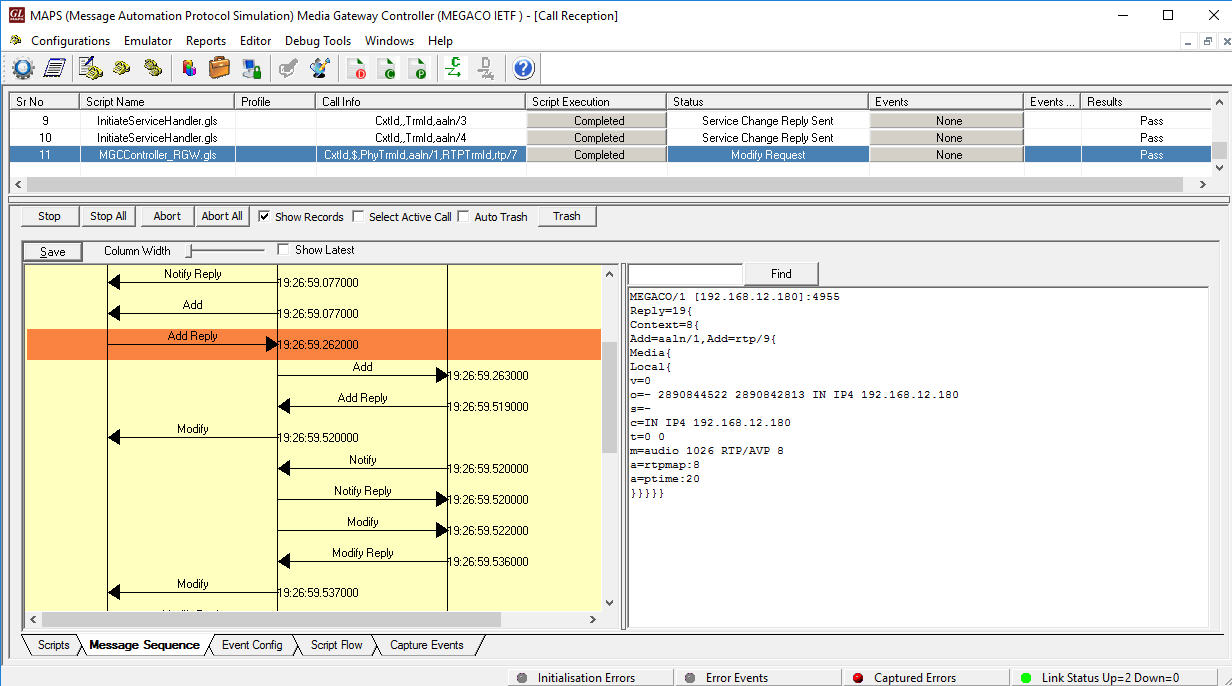
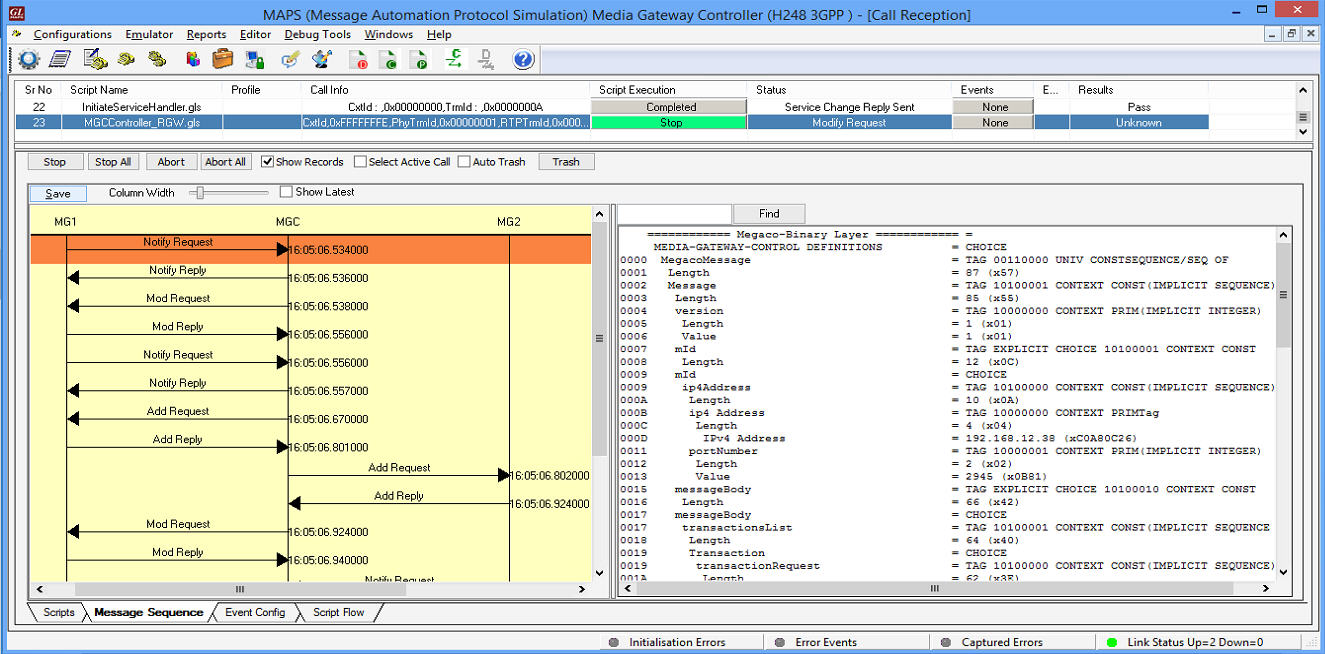
 Back to Newsletter Index Page
Back to Newsletter Index Page